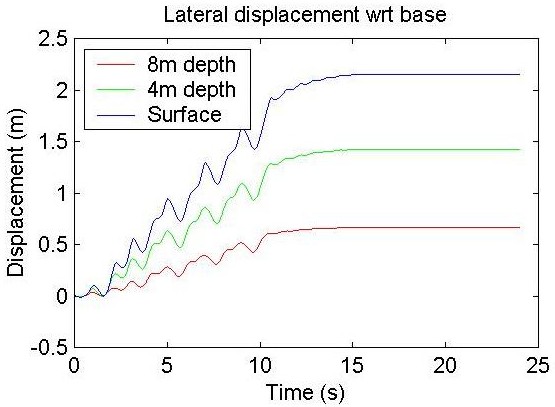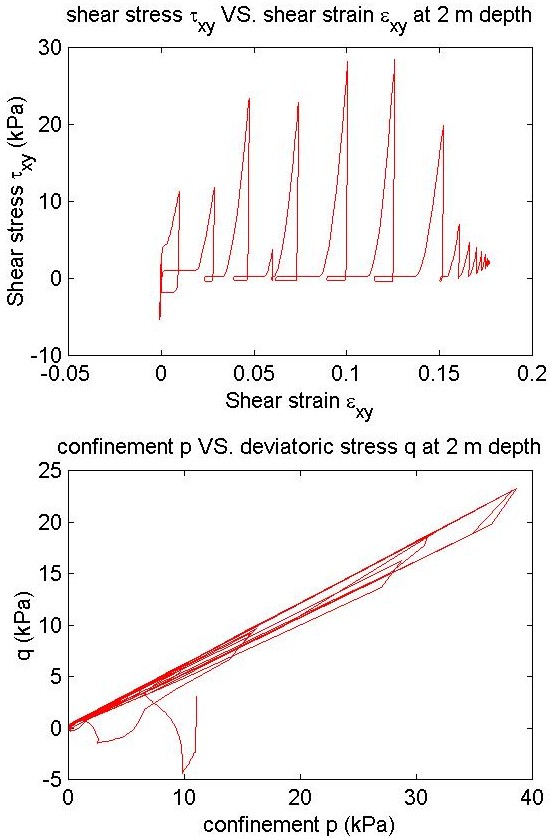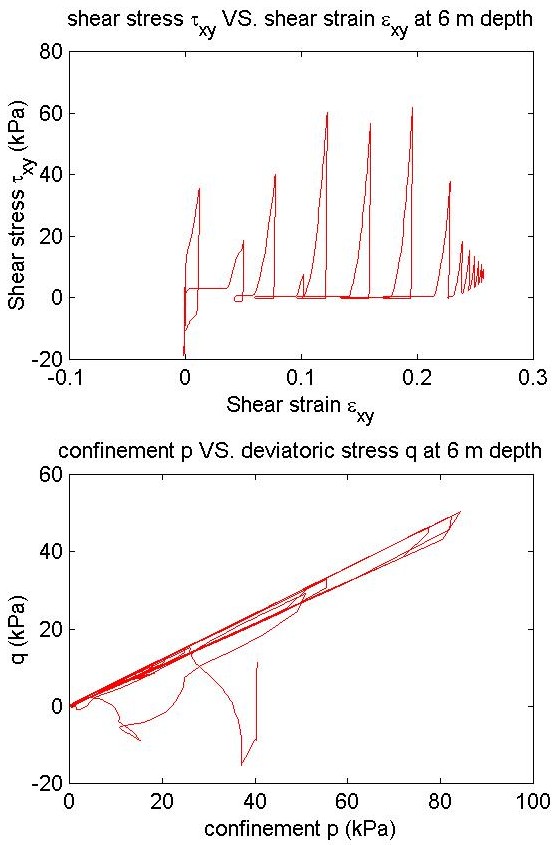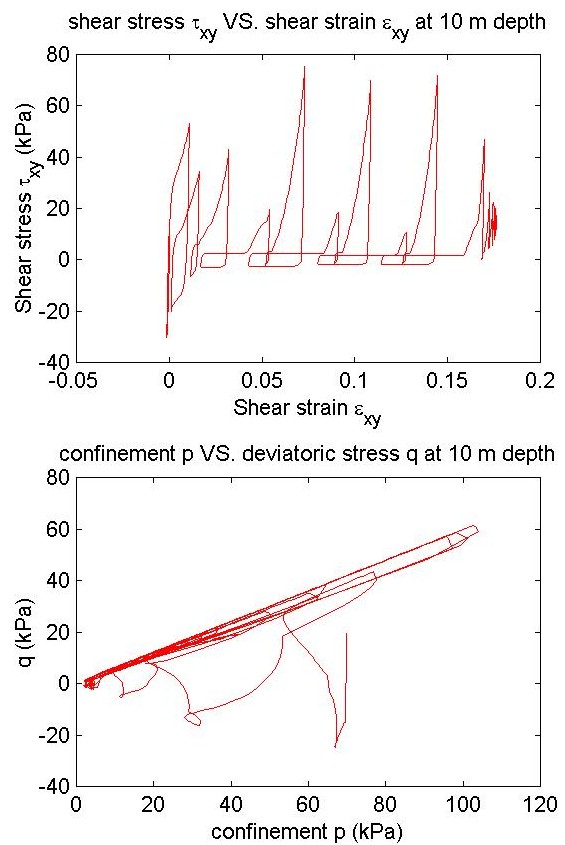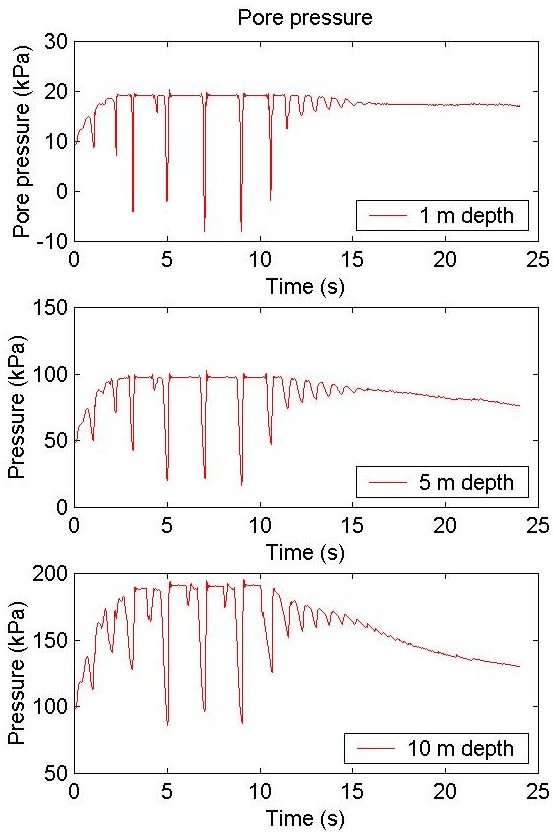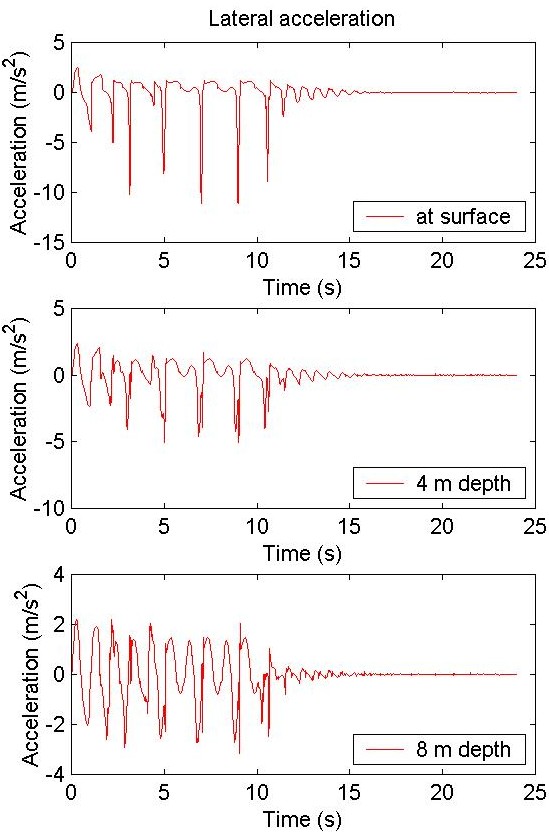PressureDependMultiYield-quadUP element
Jump to navigation
Jump to search
- Command_Manual
- Tcl Commands
- Modeling_Commands
- model
- uniaxialMaterial
- ndMaterial
- frictionModel
- section
- geometricTransf
- element
- node
- sp commands
- mp commands
- timeSeries
- pattern
- mass
- block commands
- region
- rayleigh
- Analysis Commands
- Output Commands
- Misc Commands
- DataBase Commands
Input File
#Created by Zhaohui Yang (zhyang@ucsd.edu)
#
#fully coupled, u-p formulation
#
#plane strain, shear-beam type mesh with single material,
#dynamic analysis, SI units (m, s, KN, ton)
#
wipe
#
#some user defined variables
#
set matOpt 1 ;# 1 = pressure depend;
;# 2 = pressure independ;
set fmass 1 ;# fluid mass density
set smass 2 ;# saturated soil mass density
set G 6.e4 ;
set B 2.4e5 ;
set bulk 2.2e6 ;#fluid-solid combined bulk modulus
set vperm 5.e-4 ;#vertical permeability (m/s)
set hperm 5.e-4 ;#horizontal permeability (m/s)
set accGravity 9.81 ;#acceleration of gravity
set vperm [expr $vperm/$accGravity/$fmass] ;#actual value used in computation
set hperm [expr $hperm/$accGravity/$fmass] ;#actual value used in computation
set press 0. ;# isotropic consolidation pressure on quad element(s)
set loadBias 0.07 ;# Static shear load, in percentage of gravity load (=sin(inclination angle))
set accMul 2. ;# acc. multiplier
set accNam whatever.acc ;# file name for input acc. record
set accDt 0.0166 ;# dt of input acc. record
set period 1.0 ;# Period for applied Sine wave
set deltaT 0.01 ;# time step for analysis
set numSteps 2400 ;# number of time steps
set gamma 0.6 ;# Newmark integration parameter
set massProportionalDamping 0. ;
set InitStiffnessProportionalDamping 0.002;
set numXele 1 ;# number of elements in x (H) direction
set numYele 10 ;# number of elements in y (V) direction
set xSize 1.0 ;# x direction element size
set ySize 1.0 ;# y direction element size
#############################################################
# BUILD MODEL
#create the ModelBuilder
model basic -ndm 2 -ndf 3
# define material and properties
switch $matOpt {
1 {
nDMaterial PressureDependMultiYield 1 2 $smass $G $B 31.4 .1 80 0.5\
26.5 0.1 .2 5 10 0.015 1.
}
2 {
nDMaterial PressureIndependMultiYield 2 2 1.8 4.e4 2.e5 40 .1
}
}
set gravY -$accGravity ;#calc. gravity
set gravX [expr -$gravY*$loadBias]
# define nodes
set numXnode [expr $numXele+1]
set numYnode [expr $numYele+1]
for {set i 1} {$i <= $numXnode} {incr i 1} {
for {set j 1} {$j <= $numYnode} {incr j 1} {
set xdim [expr ($i-1)*$xSize]
set ydim [expr ($j-1)*$ySize]
set nodeNum [expr $i + ($j-1)*$numXnode]
node $nodeNum $xdim $ydim
}
}
# define elements
for {set i 1} {$i <= $numXele} {incr i 1} {
for {set j 1} {$j <= $numYele} {incr j 1} {
set eleNum [expr $i + ($j-1)*$numXele]
set n1 [expr $i + ($j-1)*$numXnode]
set n2 [expr $i + ($j-1)*$numXnode + 1]
set n4 [expr $i + $j*$numXnode + 1]
set n3 [expr $i + $j*$numXnode]
# thick maTag bulk mDensity perm1 perm2 gravity press
element quadUP $eleNum $n1 $n2 $n4 $n3 1.0 $matOpt $bulk $fmass $hperm $vperm $gravX $gravY $press
}
}
#set material to elastic for gravity loading
updateMaterialStage -material $matOpt -stage 0
# fix the base, and free surface drainage
for {set i 1} {$i <= $numXnode} {incr i 1} {
fix $i 1 1 0
set surfnode [expr ($numYnode-1)*$numXnode + $i]
fix $surfnode 0 0 1
}
# tie all disp. DOFs at same level
for {set i 1} {$i < $numYnode} {incr i 1} {
set nodeNum1 [expr $i*$numXnode + 1]
for {set j 2} {$j <= $numXnode} {incr j 1} {
set nodeNum2 [expr $i*$numXnode + $j]
equalDOF $nodeNum1 $nodeNum2 1 2
}
}
#############################################################
# GRAVITY APPLICATION (elastic behavior)
# create the SOE, ConstraintHandler, Integrator, Algorithm and Numberer
numberer RCM
system ProfileSPD
test NormDispIncr 1.0e-8 25 2
algorithm Newton
constraints Penalty 1.e18 1.e18
integrator Newmark 1.5 1.
analysis Transient
analyze 3 5.e3
# switch material stage from elastic (gravity) to plastic
switch $matOpt {
1 {
updateMaterialStage -material $matOpt -stage 1
}
2 {
updateMaterialStage -material $matOpt -stage 1
}
}
analyze 5 5.e3
# rezero time
wipeAnalysis
setTime 0.0
#loadConst -time 0.0
#############################################################
# NOW APPLY LOADING SEQUENCE AND ANALYZE (plastic)
# base input motion
pattern UniformExcitation 1 1 -accel "Sine 0. 10. $period -factor $accMul"
#input motion through data file
#pattern UniformExcitation 1 1 -accel "Series -factor $accMul -filePath $accNam -dt $accDt"
#recorder for nodal variables along the vertical center line.
set nodeList {}
for {set i 0} {$i < $numYnode} {incr i 1} {
lappend nodeList [expr $numXnode/2 + $i*$numXnode]
}
#define recorders for disp., excess pore pressure, and acc.
#Note: disp and acc outputs are relative to the base
eval "recorder Node -file disp -time -node $nodeList -dof 1 2 -dT $deltaT disp"
eval "recorder Node -file pwp -time -node $nodeList -dof 3 -dT $deltaT vel"
eval "recorder Node -file acc -time -node $nodeList -dof 1 2 -dT $deltaT accel"
#stress/strain output at Gauss point 1 of each element along center line
set name1 "stress"; set name2 "strain";
for {set i 1} {$i < $numYnode} {incr i 1} {
set ele [expr $numXele-$numXele/2+($i-1)*$numXele]
set name11 [join [list $name1 $i] {}]
set name21 [join [list $name2 $i] {}]
recorder Element -ele $ele -time -file $name11 -dT $deltaT material 1 stress
recorder Element -ele $ele -time -file $name21 -dT $deltaT material 1 strain
}
#analysis options
constraints Penalty 1.e18 1.e18
test NormDispIncr 1.e-5 25 0
numberer RCM
algorithm Newton
system ProfileSPD
#some mass proportional and initial-stiffness proportional damping
rayleigh $massProportionalDamping 0.0 $InitStiffnessProportionalDamping 0.0
integrator Newmark $gamma [expr pow($gamma+0.5, 2)/4]
analysis VariableTransient
#analyze
set startT [clock seconds]
analyze $numSteps $deltaT [expr $deltaT/100] $deltaT 15
set endT [clock seconds]
puts "Execution time: [expr $endT-$startT] seconds."
wipe #flush ouput stream
MATLAB Plotting File
clear all;
a1=load('acc');
d1=load('disp');
p1=load('pwp');
s1=load('stress1');
e1=load('strain1');
s5=load('stress5');
e5=load('strain5');
s9=load('stress9');
e9=load('strain9');
fs=[0.5, 0.2, 4, 6];
accMul = 2;
%integration point 1 p-q
po=(s1(:,2)+s1(:,3)+s1(:,4))/3;
for i=1:size(s1,1)
qo(i)=(s1(i,2)-s1(i,3))^2 + (s1(i,3)-s1(i,4))^2 +(s1(i,2)-s1(i,4))^2 + 6.0* s1(i,5)^2;
qo(i)=sign(s1(i,5))*1/3.0*qo(i)^0.5;
end
figure(1); close 1; figure(1);
%integration point 1 stress-strain
subplot(2,1,1), plot(e1(:,4),s1(:,5),'r');
title ('shear stress \tau_x_y VS. shear strain \epsilon_x_y at 10 m depth');
xLabel('Shear strain \epsilon_x_y');
yLabel('Shear stress \tau_x_y (kPa)');
subplot(2,1,2), plot(-po,qo,'r');
title ('confinement p VS. deviatoric stress q at 10 m depth');
xLabel('confinement p (kPa)');
yLabel('q (kPa)');
set(gcf,'paperposition',fs);
saveas(gcf,'SS_PQ_10m','jpg');
%integration point 5 p-q
po=(s5(:,2)+s5(:,3)+s5(:,4))/3;
for i=1:size(s5,1)
qo(i)=(s5(i,2)-s5(i,3))^2 + (s5(i,3)-s5(i,4))^2 +(s5(i,2)-s5(i,4))^2 + 6.0* s5(i,5)^2;
qo(i)=sign(s5(i,5))*1/3.0*qo(i)^0.5;
end
figure(5); close 5; figure(5);
%integration point 5 stress-strain
subplot(2,1,1), plot(e5(:,4),s5(:,5),'r');
title ('shear stress \tau_x_y VS. shear strain \epsilon_x_y at 6 m depth');
xLabel('Shear strain \epsilon_x_y');
yLabel('Shear stress \tau_x_y (kPa)');
subplot(2,1,2), plot(-po,qo,'r');
title ('confinement p VS. deviatoric stress q at 6 m depth');
xLabel('confinement p (kPa)');
yLabel('q (kPa)');
set(gcf,'paperposition',fs);
saveas(gcf,'SS_PQ_6m','jpg');
%integration point 9 p-q
po=(s9(:,2)+s9(:,3)+s9(:,4))/3;
for i=1:size(s1,1)
qo(i)=(s9(i,2)-s9(i,3))^2 + (s9(i,3)-s9(i,4))^2 +(s9(i,2)-s9(i,4))^2 + 6.0* s9(i,5)^2;
qo(i)=sign(s9(i,5))*1/3.0*qo(i)^0.5;
end
figure(6); close 6; figure(6);
%integration point 9 stress-strain
subplot(2,1,1), plot(e9(:,4),s9(:,5),'r');
title ('shear stress \tau_x_y VS. shear strain \epsilon_x_y at 2 m depth');
xLabel('Shear strain \epsilon_x_y');
yLabel('Shear stress \tau_x_y (kPa)');
subplot(2,1,2), plot(-po,qo,'r');
title ('confinement p VS. deviatoric stress q at 2 m depth');
xLabel('confinement p (kPa)');
yLabel('q (kPa)');
set(gcf,'paperposition',fs);
saveas(gcf,'SS_PQ_2m','jpg');
figure(2); close 2; figure(2);
%node 3 displacement relative to node 1
subplot(2,1,1),a=plot(d1(:,1),d1(:,8),'r');
hold on
subplot(2,1,1),b=plot(d1(:,1),d1(:,14),'g');
hold on
subplot(2,1,1),c=plot(d1(:,1),d1(:,22),'b');
title ('Lateral displacement wrt base');
xLabel('Time (s)');
yLabel('Displacement (m)');
legend([a,b,c],'8m depth','4m depth', 'Surface',2)
set(gcf,'paperposition',fs);
saveas(gcf,'Disp','jpg');
s=accMul*sin(0:pi/50:20*pi);
s=[s';zeros(3000,1)];
s1=interp1(0:0.01:40,s,a1(:,1));
figure(3); close 3; figure(3);
%node acceleration
subplot(3,1,1),a=plot(a1(:,1),s1+a1(:,22),'r');
legend(a,'at surface',4);
title ('Lateral acceleration');
xLabel('Time (s)');
yLabel('Acceleration (m/s^2)');
subplot(3,1,2),a=plot(a1(:,1),s1+a1(:,14),'r');
legend(a,'4 m depth',4);
xLabel('Time (s)');
yLabel('Acceleration (m/s^2)');
subplot(3,1,3),a=plot(a1(:,1),s1+a1(:,8),'r');
legend(a,'8 m depth',4);
xLabel('Time (s)');
yLabel('Acceleration (m/s^2)');
set(gcf,'paperposition',fs);
saveas(gcf,'Acc','jpg');
figure(4); close 4; figure(4);
subplot(3,1,1),a=plot(p1(:,1),p1(:,11),'r');
legend(a,'1 m depth',4);
title ('Pore pressure');
xLabel('Time (s)');
yLabel('Pore pressure (kPa)');
subplot(3,1,2),a=plot(p1(:,1),p1(:,7),'r');
legend(a,'5 m depth',4);
xLabel('Time (s)');
yLabel('Pressure (kPa)');
subplot(3,1,3),a=plot(p1(:,1),p1(:,2),'r');
legend(a,'10 m depth',4);
xLabel('Time (s)');
yLabel('Pressure (kPa)');
set(gcf,'paperposition',fs);
saveas(gcf,'EPWP','jpg');
Displacement Output File
Stress-Strain Output File (2 m depth)
Stress-Strain Output File (6 m depth)
Stress-Strain Output File (10 m depth)
Excess Pore Pressure Output File
Acceleration Output File
Return to:
- Element Command
- UC San Diego u-p element (saturated soil)
- NDMaterial Command
- UC San Diego soil models (Linear/Nonlinear, dry/drained/undrained soil response under general 2D/3D static/cyclic loading conditions (please visit UCSD for examples)
- UC San Diego Saturated Undrained soil
- Related References
